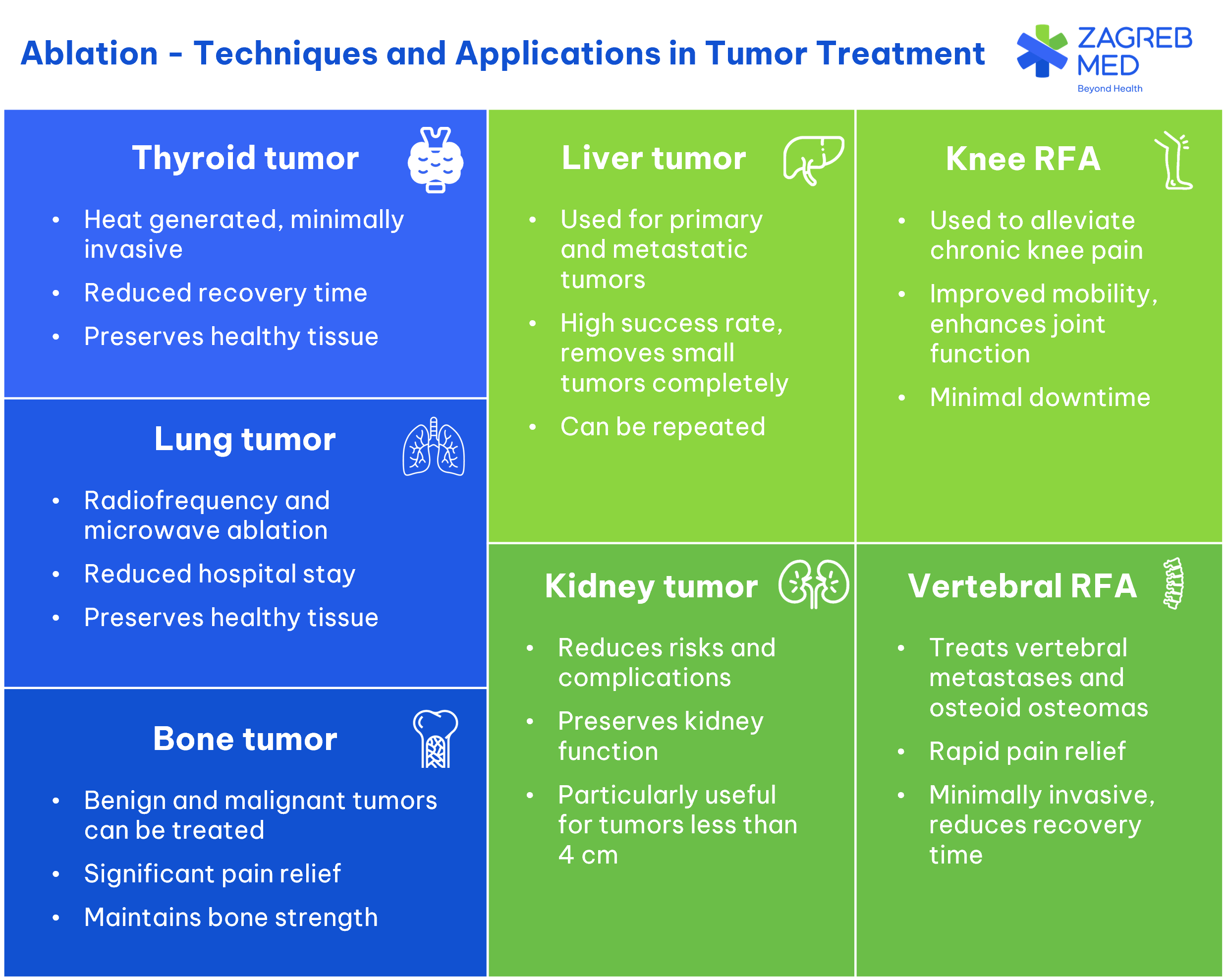Ablation is a minimally invasive procedure that uses heat, cold, or chemical agents to destroy abnormal tissue.
In this blog, we'll delve into different types of ablation, focusing on their application in treating thyroid, lung, bone, liver, and kidney tumors, as well as specific procedures like radiofrequency ablation of the knee and percutaneous vertebral radiofrequency ablation.
Hospital Agram is a leading medical institution renowned for its advanced healthcare services and state-of-the-art facilities. Among its many specialised offerings, Hospital Agram excels in minimally invasive procedures for treating various tumors and chronic pain conditions.
Dr. Luka Novosel, a subspecialist in interventional radiology, is at the forefront of these innovative treatments. His expertise covers a broad spectrum of procedures.
Understanding Tumors: A Brief Overview
Tumors are abnormal growths of cells that can be benign (non-cancerous) or malignant (cancerous). While benign tumors usually grow slowly and do not spread, malignant tumors can invade nearby tissues and metastasise to other parts of the body. Common treatments for tumors include surgery, chemotherapy, radiation therapy, and increasingly, ablation techniques. Ablation refers to the removal or destruction of tissue, often used to treat tumors and manage chronic pain. These methods are increasingly preferred due to their minimally invasive nature, shorter recovery times, and targeted approach.

Thermal Ablation of Thyroid Tumors
Thermal ablation is an effective treatment option for benign and malignant thyroid tumors. The procedure uses heat generated by radiofrequency, laser, or microwave energy to destroy tumor cells.
It offers several benefits:
- Minimally invasive: Requires only a small incision or needle puncture.
- Reduced recovery time: Patients typically recover faster compared to traditional surgery.
- Preservation of thyroid function: Helps in maintaining normal thyroid function by targeting only the tumor.
In addition to these benefits, thermal ablation can be an excellent option for patients who are not good candidates for surgery due to underlying health conditions or those who prefer a less invasive approach.
Thermal Ablation of Lung Tumors
Thermal ablation, including radiofrequency and microwave ablation, is used to treat primary and metastatic lung tumors. This technique is particularly useful for patients who are not candidates for surgery due to medical comorbidities.
Key advantages include:
- Local control: Effective in controlling tumor growth locally.
- Outpatient procedure: Often performed on an outpatient basis, reducing hospital stays.
- Minimal impact on lung function: Preserves healthy lung tissue and function.
Lung tumors can be challenging to treat due to their location and the importance of preserving lung function. Thermal ablation offers a way to target tumors precisely while minimizing damage to surrounding tissues.
Thermal Ablation of Bone Tumors
Bone tumors, both benign and malignant, can be treated with thermal ablation to relieve pain and control tumor growth.
This technique is particularly beneficial for:
- Pain management: Provides significant pain relief for patients with painful bone metastases.
- Structural preservation: Helps in maintaining bone strength and structure.
- Quick recovery: Allows patients to return to normal activities faster.
Bone tumors can cause significant pain and reduce mobility. Ablation techniques can help manage these symptoms and improve the quality of life for patients.
Thermal Ablation of Liver Tumors
Thermal ablation, including radiofrequency and microwave ablation, is widely used for treating primary liver cancer (hepatocellular carcinoma) and metastatic liver tumors.
Benefits include:
- High success rate: Effective in achieving complete tumor necrosis in small tumors.
- Repeatability: Can be repeated if new tumors develop.
- Liver function preservation: Minimizes damage to healthy liver tissue.
The liver is a common site for both primary and metastatic tumors. Ablation offers a targeted approach that can complement other treatments like chemotherapy and surgery.
Thermal Ablation of Kidney Tumors
Thermal ablation is an option for patients with small renal tumors who are not suitable candidates for surgery.
The procedure offers:
- Minimally invasive approach: Reduces surgical risks and complications.
- Nephron sparing: Preserves kidney function by targeting only the tumor.
- Effective for small tumors: Particularly useful for tumors less than 4 cm in diameter.
Kidney tumors often require precise treatment to preserve as much kidney function as possible. Thermal ablation provides an effective way to achieve this goal.
Radiofrequency Ablation (RFA) of the Knee
RFA of the knee is a technique used to alleviate chronic knee pain, often due to osteoarthritis. The procedure involves the use of radiofrequency energy to disrupt pain signals.
Benefits include:
- Pain relief: Significant reduction in knee pain.
- Improved mobility: Enhances joint function and mobility.
- Outpatient procedure: Performed under local anesthesia with minimal downtime.
Chronic knee pain can significantly impact daily activities and quality of life. RFA offers a minimally invasive option to manage pain and improve function.
Percutaneous Vertebral Radiofrequency Ablation
Percutaneous vertebral radiofrequency ablation is used to treat painful vertebral metastases and osteoid osteomas.
This technique offers:
- Pain reduction: Provides rapid and significant pain relief.
- Structural integrity: Helps in stabilizing the affected vertebra.
- Minimally invasive: Involves a small incision, reducing recovery time.
Vertebral tumors can cause severe pain and compromise spinal stability. Radiofrequency ablation can provide effective pain relief and improve structural integrity.
Ablation techniques represent a powerful and versatile tool in modern medicine, offering minimally invasive options for treating various types of tumors and chronic pain conditions. From thyroid and lung tumors to bone and liver tumors, thermal ablation provides effective local control, pain relief, and preservation of organ function. As technology and techniques continue to advance, ablation will play an increasingly vital role in the treatment of complex medical conditions, improving patient outcomes and quality of life.
By understanding the different applications and benefits of ablation, patients and healthcare providers can make informed decisions about incorporating these innovative treatments into comprehensive care plans. Whether it's for managing chronic pain or targeting specific tumors, ablation offers a promising pathway toward better health and improved quality of life.
